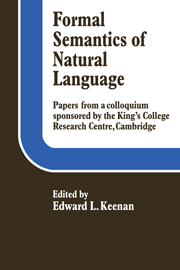Book contents
- Frontmatter
- Contents
- Notes on the contributors
- Acknowledgements
- Introduction
- I QUANTIFICATION IN NATURAL LANGUAGE
- II REFERENCE AND CROSS REFERENCE
- Deixis as the source of reference
- Referential constraints on lexical items
- On generics
- Quantifiers, definite descriptions, and reference
- III INTENSIONAL LOGIC AND SYNTACTIC THEORY
- IV QUESTIONING MODEL THEORETIC SEMANTICS
- V PRAGMATICS AND SENTENCES IN CONTEXT
- VI SEMANTICS AND SURFACE SYNTAX
On generics
Published online by Cambridge University Press: 05 November 2011
- Frontmatter
- Contents
- Notes on the contributors
- Acknowledgements
- Introduction
- I QUANTIFICATION IN NATURAL LANGUAGE
- II REFERENCE AND CROSS REFERENCE
- Deixis as the source of reference
- Referential constraints on lexical items
- On generics
- Quantifiers, definite descriptions, and reference
- III INTENSIONAL LOGIC AND SYNTACTIC THEORY
- IV QUESTIONING MODEL THEORETIC SEMANTICS
- V PRAGMATICS AND SENTENCES IN CONTEXT
- VI SEMANTICS AND SURFACE SYNTAX
Summary
In this paper, I am going to discuss two closely related phenomena, namely generic tense and generic noun phrases. By ‘generic tense’ I am referring to cases such as the following:
Beavers build dams
I write with my left hand
John smokes cigars
Dogs bark
The sun rises in the east
Oil floats on water
John does not speak German
A gentleman does not offend a lady
Examples of generic noun phrases are the italicized constituents in the following sentences:
Beavers build dams
A beaver builds dams
The beaver builds dams
I shall mainly be concerned with the types exemplified by (9) and (10), i.e. indefinite generic noun phrases.
I am going to claim in this paper that the common semantic property of all generic expressions is that they are used to express law-like, or nomic, statements. The first thing to be done is to make this concept clear. A suitable way of doing so to a linguistic audience may be by using the following example, taken from Chomsky and Halle (1968). Suppose only inhabitants of Tasmania survive a future war, they say. ‘It might then be a property of all then existing languages that pitch is not used to differentiate lexical items.’
Information
- Type
- Chapter
- Information
- Formal Semantics of Natural Language , pp. 99 - 111Publisher: Cambridge University PressPrint publication year: 1975
Accessibility standard: Unknown
Why this information is here
This section outlines the accessibility features of this content - including support for screen readers, full keyboard navigation and high-contrast display options. This may not be relevant for you.Accessibility Information
- 110
- Cited by
